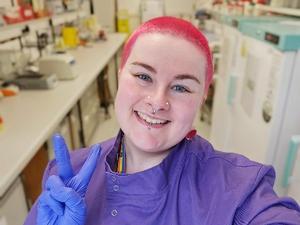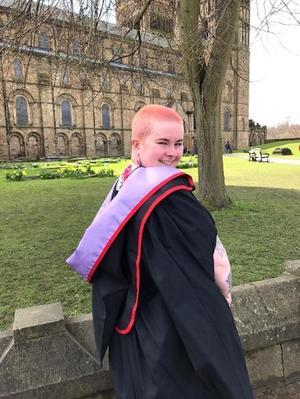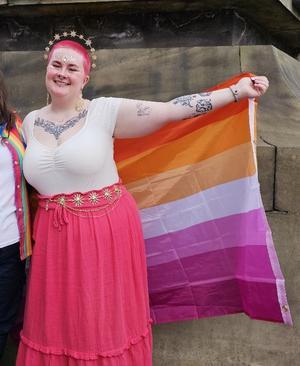LGBTQ+ STEM Day 2024: Charlotte Roughton
Could you tell us a bit more about yourself?
My name is Charlotte Roughton (she/her), I currently work at Newcastle University, UK and I identify as a lesbian. I am in the final stages of my PhD, where I researched the molecular mechanisms of sporulation in the superbug C. difficile. I now work as a Biological Teaching Technician at the same institution, where I provide technical support with undergraduate practicals. In my free time, I enjoy various crafts such as cross stitch, crochet, embroidery and I am an unapologetic nerd who loves playing Dungeons & Dragons.

It’s LGBTQ+ STEM Day on 18 November; are you doing anything this year to raise awareness?
Apart from participating in this blog, I don’t have specific plans this year to raise awareness for LGBTQ+ STEM Day – largely because I’ve recently been working full-time alongside finishing my thesis and preparing for my viva, so I’ve been spread quite thin and cautious of making too many commitments. I do, however, actively engage with my local LGBTQ+ community by volunteering with the Albert Kennedy Trust’s Youth Engagement team and attending a weekly queer art club.
Could you tell us about your professional experience, as someone who is openly part of the LGBTQ+ community?
I’ve been very fortunate that my experiences so far have been positive, even as I’ve become more open about mentioning my girlfriend and presenting myself in a much more visibly queer way, I find starting new roles with new teams nerve wracking while I find my feet and gauge whether the environment is a supportive and inclusive one, but so far I haven’t been subjected to any bias or prejudice (as far as I’m aware).
Do you think the STEM community has become more open to talking about issues affecting people identifying as LGBTQ+?
I think so – however it’s important to note that this is from my perspective as someone who has only ever worked at UK institutions. In the institutions I’ve worked at, there does seem to be a growing emphasis on creating a more inclusive working environment, with measures such as LGBTQ+ staff networks, compulsory EDI training and gender neutral toilets being introduced. More widely, it has been wonderful to see and engage with initiatives such as 500 Queer Scientists, Pride in STEM, and the Microbiology Society’s Queer in Microbiology network, which continue to play a vital role in promoting inclusivity, fostering community and raising awareness surrounding the issues affecting LGBTQ+ people.
What advice would you give to LGBTQ+ individuals who are considering a career in in STEM?

I would encourage LGBTQ+ individuals to find their community, whether that be in-person (through dedicated societies and staff networks) or online (through social media and initiatives such as the Queer in Microbiology network). Although visibility and representation of LGBTQ+ people in STEM roles are still lacking, especially those in senior positions, they are out there – it may just require some initiative to find them. Engaging with the online LGBTQ+ in STEM community was a crucial turning point for me. Seeing others who were out and proud whilst also flourishing in their careers really helped me to address my own internalised homophobia and realise that I can be my authentic self at work.
I would also advise that LGBTQ+ individuals don’t underestimate the courage it can take to come out, and to remember that they don’t owe it to anybody. It’s an entirely personal process that should be done solely on the individual’s terms, at their own pace, if/when they feel comfortable doing so. In my own experience, being out has brought with it an unparalleled sense of liberation and allowed me to be my best self in the workplace, so it was worth pushing myself through the initial feelings of discomfort. However, safety is paramount, so I would encourage individuals to firstly assess whether being out in their workplace could put them at risk of harm before doing so.
Nonetheless, STEM is at its finest and of the highest quality with a more diverse workforce, so being LGBTQ+ should not hinder anybody from exploring this highly rewarding career path.
Are there any changes or improvements that are needed in STEM fields to better support LGBTQ+ professionals?
Absolutely. As I mentioned earlier, great strides have been made towards LGBTQ+ inclusion and creating safer workspaces, but this is also accompanied by challenges such as rising hate crimes and frightening anti-transgender rhetoric. The statistics are also very telling, with LGBTQ+ people who work in STEM still reporting feelings of isolation and marginalisation. It’s a multifaceted problem without a single clear solution, but allies can certainly do their bit to help by advocating for the implementation of inclusive policies in their workplace, dedicating the time to self-educate and engage with LGBTQ+-led resources and committing to the principles of being an active bystander to directly challenge discriminatory behaviour. However, this is far from an exhaustive list and exactly how much and what needs to be done to better support LGBTQ+ professionals can vary depending on where in the world a person is based.
What has been the highlight of your career so far; and what do you hope to achieve in your career in the future?
Although I still have my viva to go, my proudest achievement has been making it nearly to the end of my PhD. It’s been a difficult road that has pushed me to my limit several times, especially with the additional challenges of starting it during a pandemic, but I’m proud of myself for making it through and for how much I’ve developed as a person throughout. Staying in academia as a researcher long-term was never on the cards for me, but I discovered a real love for teaching, science communication and outreach during my PhD, which I hope to continue exploring in my career.
You are an incoming member of the Members Panel. What made you want to join the Panel?

I’ve been a member of the Microbiology Society for several years now (since I started my PhD) and I’ve always had a great deal of admiration for the Society’s commitment to creating an inclusive environment for its members from historically marginalised communities and for the people who work tirelessly behind the scenes to drive positive change. I appreciate that the Society has the Members Panel to ensure that decision-making is informed by the lived experiences of as diverse a range of microbiologists as possible and that Equality, Diversity and Inclusion (EDI) is embedded into the foundations of how the Society functions rather than merely being considered a tick-box exercise. Due to this, and my own lived experiences as a lesbian, autistic person and first-generation researcher, I have a vested interest in helping contribute towards the Society’s initiatives more directly and look forward to what my term will bring.
To find out more about our EDI initiatives and take part in an upcoming Awareness Day, view our equality, diversity and inclusion webpages.
